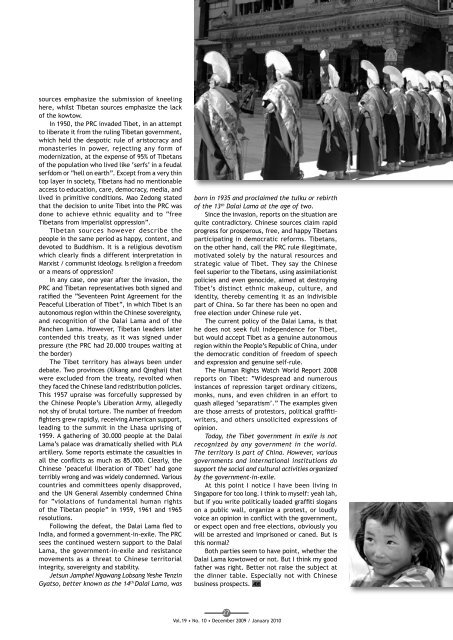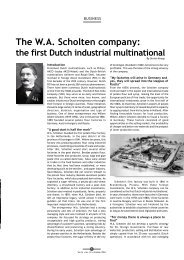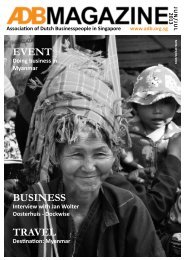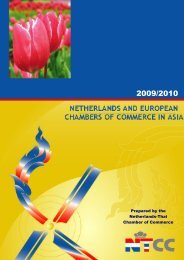December 2009 / January 2010 - Association of Dutch Businessmen
December 2009 / January 2010 - Association of Dutch Businessmen
December 2009 / January 2010 - Association of Dutch Businessmen
Create successful ePaper yourself
Turn your PDF publications into a flip-book with our unique Google optimized e-Paper software.
sources emphasize the submission <strong>of</strong> kneeling<br />
here, whilst Tibetan sources emphasize the lack<br />
<strong>of</strong> the kowtow.<br />
In 1950, the PRC invaded Tibet, in an attempt<br />
to liberate it from the ruling Tibetan government,<br />
which held the despotic rule <strong>of</strong> aristocracy and<br />
monasteries in power, rejecting any form <strong>of</strong><br />
modernization, at the expense <strong>of</strong> 95% <strong>of</strong> Tibetans<br />
<strong>of</strong> the population who lived like ‘serfs’ in a feudal<br />
serfdom or “hell on earth”. Except from a very thin<br />
top layer in society, Tibetans had no mentionable<br />
access to education, care, democracy, media, and<br />
lived in primitive conditions. Mao Zedong stated<br />
that the decision to unite Tibet into the PRC was<br />
done to achieve ethnic equality and to “free<br />
Tibetans from imperialist oppression”.<br />
Tibetan sources however describe the<br />
people in the same period as happy, content, and<br />
devoted to Buddhism. It is a religious devotism<br />
which clearly finds a different interpretation in<br />
Marxist / communist ideology. Is religion a freedom<br />
or a means <strong>of</strong> oppression?<br />
In any case, one year after the invasion, the<br />
PRC and Tibetan representatives both signed and<br />
ratified the “Seventeen Point Agreement for the<br />
Peaceful Liberation <strong>of</strong> Tibet”, in which Tibet is an<br />
autonomous region within the Chinese sovereignty,<br />
and recognition <strong>of</strong> the Dalai Lama and <strong>of</strong> the<br />
Panchen Lama. However, Tibetan leaders later<br />
contended this treaty, as it was signed under<br />
pressure (the PRC had 20.000 troupes waiting at<br />
the border)<br />
The Tibet territory has always been under<br />
debate. Two provinces (Xikang and Qinghai) that<br />
were excluded from the treaty, revolted when<br />
they faced the Chinese land redistribution policies.<br />
This 1957 upraise was forcefully suppressed by<br />
the Chinese People’s Liberation Army, allegedly<br />
not shy <strong>of</strong> brutal torture. The number <strong>of</strong> freedom<br />
fighters grew rapidly, receiving American support,<br />
leading to the summit in the Lhasa uprising <strong>of</strong><br />
1959. A gathering <strong>of</strong> 30.000 people at the Dalai<br />
Lama’s palace was dramatically shelled with PLA<br />
artillery. Some reports estimate the casualties in<br />
all the conflicts as much as 85.000. Clearly, the<br />
Chinese ‘peaceful liberation <strong>of</strong> Tibet’ had gone<br />
terribly wrong and was widely condemned. Various<br />
countries and committees openly disapproved,<br />
and the UN General Assembly condemned China<br />
for “violations <strong>of</strong> fundamental human rights<br />
<strong>of</strong> the Tibetan people” in 1959, 1961 and 1965<br />
resolutions.<br />
Following the defeat, the Dalai Lama fled to<br />
India, and formed a government-in-exile. The PRC<br />
sees the continued western support to the Dalai<br />
Lama, the government-in-exile and resistance<br />
movements as a threat to Chinese territorial<br />
integrity, sovereignty and stability.<br />
Jetsun Jamphel Ngawang Lobsang Yeshe Tenzin<br />
Gyatso, better known as the 14 th Dalai Lama, was<br />
born in 1935 and proclaimed the tulku or rebirth<br />
<strong>of</strong> the 13 th Dalai Lama at the age <strong>of</strong> two.<br />
Since the invasion, reports on the situation are<br />
quite contradictory. Chinese sources claim rapid<br />
progress for prosperous, free, and happy Tibetans<br />
participating in democratic reforms. Tibetans,<br />
on the other hand, call the PRC rule illegitimate,<br />
motivated solely by the natural resources and<br />
strategic value <strong>of</strong> Tibet. They say the Chinese<br />
feel superior to the Tibetans, using assimilationist<br />
policies and even genocide, aimed at destroying<br />
Tibet’s distinct ethnic makeup, culture, and<br />
identity, thereby cementing it as an indivisible<br />
part <strong>of</strong> China. So far there has been no open and<br />
free election under Chinese rule yet.<br />
The current policy <strong>of</strong> the Dalai Lama, is that<br />
he does not seek full independence for Tibet,<br />
but would accept Tibet as a genuine autonomous<br />
region within the People’s Republic <strong>of</strong> China, under<br />
the democratic condition <strong>of</strong> freedom <strong>of</strong> speech<br />
and expression and genuine self-rule.<br />
The Human Rights Watch World Report 2008<br />
reports on Tibet: “Widespread and numerous<br />
instances <strong>of</strong> repression target ordinary citizens,<br />
monks, nuns, and even children in an effort to<br />
quash alleged ‘separatism’.” The examples given<br />
are those arrests <strong>of</strong> protestors, political graffitiwriters,<br />
and others unsolicited expressions <strong>of</strong><br />
opinion.<br />
Today, the Tibet government in exile is not<br />
recognized by any government in the world.<br />
The territory is part <strong>of</strong> China. However, various<br />
governments and international institutions do<br />
support the social and cultural activities organized<br />
by the government-in-exile.<br />
At this point I notice I have been living in<br />
Singapore for too long. I think to myself: yeah lah,<br />
but if you write politically loaded graffiti slogans<br />
on a public wall, organize a protest, or loudly<br />
voice an opinion in conflict with the government,<br />
or expect open and free elections, obviously you<br />
will be arrested and imprisoned or caned. But is<br />
this normal?<br />
Both parties seem to have point, whether the<br />
Dalai Lama kowtowed or not. But I think my good<br />
father was right. Better not raise the subject at<br />
the dinner table. Especially not with Chinese<br />
business prospects.<br />
27<br />
Vol.19 • No. 10 • <strong>December</strong> <strong>2009</strong> / <strong>January</strong> <strong>2010</strong>
















